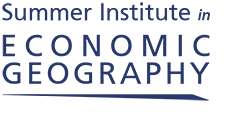“As an alumnus of the first Summer Institute (2003), and a recent featured speaker (2014), I can say that it is one of the most significant and valuable professional events held regularly in the field of economic geography. Not only does the Institute provide participants with an opportunity to engage in intensive, stimulating, collegial, and highly substantive discussions about the field and emerging research agendas, it also serves a valuable role by helping current and recently graduated PhD students to understand the academic enterprise and the challenges of, among other things, navigating the publishing and professional worlds we work in. Several of the friendships and professional ties that began at the Institute I attended in 2003 have played a central role in my career development and I have seen many alumni emerge as leaders among the current and next generation of economic geographers. This is a vital initiative, one that strengthens and sustains the field by imbuing in its participants a sense of purpose, identity, and commitment to research and teaching that can deploy economic geography concepts and theories in ways that help us better understand the causes and potential solutions to pressing socioeconomic, political, and environmental issues worldwide.”
James T. Murphy, PhD, Associate Professor, Graduate School of Geography, Clark University
